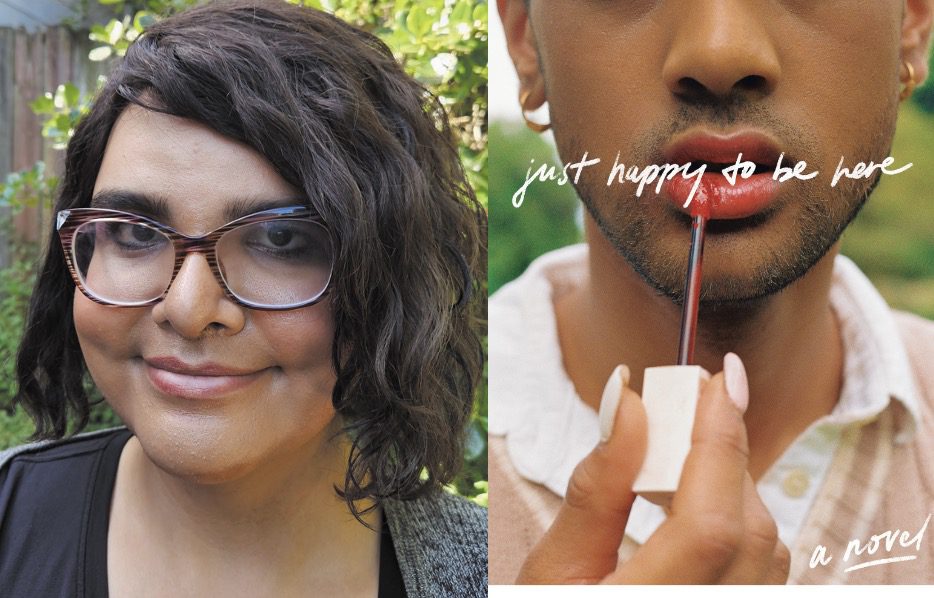Tara is a transgender teenager who lacks access to gender-affirming care. She really wants to fit in at the all-girls high school in Virginia, but it’s difficult when she knows how much she physically stands out. This is the beginning of Naomi Kanakia’s Just Happy to Be Here, a young adult (YA) novel about navigating girlhood amidst ongoing political attacks on one’s very existence.
Tara doesn't want to be an activist or spokesperson for the trans community. She simply wants to make friends, feel “normal,” whatever that means, and gain entry into an exclusive club where she feels like she belongs.
When it becomes clear that Tara’s entry into the club is not assured, many students believe transphobia is to blame. However, even Tara isn't certain about that. Despite this, she feels pressured to stand up and fight when all she really wants to do is fade into the background and keep working on convincing her parents she needs gender-affirming care as soon as possible. As much as she doesn’t want to face discrimination, she also doesn’t want people to think she deserves special treatment because of her identity.
More than anything, Just Happy To Be Here is about a girl who desperately wants to be seen for who she is and not for being trans. Kanakia talked with LGBTQ Nation about creating the story in today’s turbulent political climate and the immense responsibility she feels to ensure the novel has a positive impact on trans readers.
LGBTQ NATION: While you were writing this book, state legislatures were debating and passing bans on gender-affirming care. What was it like to work on the story while the events it’s based on were still unfolding?
NAOMI KANAKIA: When I pitched the book in 2021, trans issues were not national issues. They were not things that presidential candidates cared about or that governors ran on. There were indications that this was going to become a focus for Republican operatives, but it was not on my radar, and I don’t think it was on many people’s radars. So when I wrote the first draft of the book in 2021, it didn’t really include any of that.
And then the very first ban on gender-affirming care became law on April 6, 2021 in Arkansas. As I was revising, I started incorporating some of this. I knew the book was coming out in a reasonable amount of time, so I should include something to show how this is suddenly a national issue. It just kept getting worse.
In my author’s note, I mentioned that 10 states had bans on gender-affirming care for teens, and now it has risen to more than 20. At the time, it felt quite surreal; it still feels somewhat surreal. Because being trans is not very interesting. It’s very interesting for the person who goes through it, but to add this whole element where you’re suddenly a public enemy is very strange.
During the same period of time I wrote the book, I read Anne Frank’s diary, and I think the thing that has always struck people about it is that like 90% of what she writes about is like, she has a crush on Peter and she gets annoyed at her mom. It’s very ordinary stuff, but then against the backdrop of such an extraordinary situation, it’s difficult for her to understand.
Let’s discuss the relationship between Tara, a transgender girl, and Liam, a transgender boy, both attending a school for girls. Liam is active in advocating for causes and addressing injustices, while Tara prefers to blend in and live her life quietly. Why did you choose to create these two different characters?
Most transgender individuals, or at least the ones I know, are highly involved in politics. Tara is different in that she prefers assimilation.
Personally, I also aim to assimilate. While I have not succeeded and may not succeed, I would prefer to blend in. I live in San Francisco and have a home. I participate in the PTA at my child's school. I am not radical. I simply want to fit in. I am aware that we are a coalition with diverse needs. Medical transition is crucial for someone like me. However, for nonbinary and genderqueer individuals, it is not necessarily a part of their trans experience. For individuals like me and Tara, being trans is not primarily a form of self-expression. We simply want to belong.
I believe that individuals who share my ideals sometimes sacrifice the needs of others. I have benefited from the acceptance of visibly gender nonconforming individuals.
Twenty years ago, there was no debate about bathrooms because individuals like me never used public restrooms. Now I can, but I am not certain about the right way to be. I simply felt that Tara had a particular approach.
I struggle to cater to young adult readers. At one point, they did not appreciate issue-based novels and only wanted books about LGBTQ+ joy. I believe Tara is striving for queer joy. She is not seeking to cause trouble. However, people may criticize her for ignoring or enduring transphobia. Some people, particularly those who are not trans girls or women, have unrealistic expectations of our lives. Very few trans girls and women are free from transphobia. To experience queer joy, one must be resilient and learn to overlook a lot.
In an essay you wrote, you mentioned, “If I thought even one teenager would be harmed by my work, I wouldn’t write it.” That’s a significant responsibility. How do you consider this when writing?
When I was younger, I was deeply impacted by achievements in gay civil rights. I distinctly remember when Elliot Page came out as a lesbian. Me and my boyfriend at the time were in tears. In my upbringing, there were barely any gay films or celebrities, aside from Elton John.
I vividly recall feeling that the world was becoming more open and things were improving. However, the progress was not as significant as I had expected. I do not want my book to lead someone to come out in a dangerous situation. I am terrified by the thought of my work inspiring someone to come out and face danger. I cannot be there to help or support them.
So it’s very scary. I would like for someone to read my book and think, yes, I’m trans. This is wonderful. This is right for me. But then I also want them to feel scared, you know? But at the same time, I really don’t want them to be too scared. Because I definitely don’t want them to read my book and feel like, oh yeah, life is awful for trans people, I’m just gonna kill myself. It’s not a responsibility I ever felt before writing this book. Because there are not really a lot of portrayals of trans girls in books for teens.
In places like Virginia, where the story takes place, it’s getting harder to get books like this into the hands of students who might really need them. What would you say to a school board or parent who doesn’t believe kids should have access to books like this?
They don’t believe that being trans is real; there’s nothing you can say to them. They think it’s a conspiracy, that it’s a notion that has been transmitted to kids. I mean, there’s no convincing them. If I also believed there was some sort of dangerous social contagion that had no basis in life science and if people caught it they would have no chance of having a happy life and they would just be monsters who physically mutilate themselves, then yeah, I would also be against having access to those.
It’s difficult because these are questions of fact, and you’re simply not correct on the fact. I do think schools and libraries should have the right to purchase only the books that they think are worthwhile to buy. I do think it is a little bit cliché to be so concerned about ideas in books. I mean, all the kids have the Internet; they’re all on TikTok. These book bans are not to restrict information. They know the kids are going to learn about being trans. It’s basically just to bully and intimidate kids, to signal you’re not welcome here in this library or in this school.
It’s the same with these bathroom bans. Utah just passed one. Could I go to Utah and just avoid using bathrooms in the airport and not visit government buildings and just look for gender-neutral bathrooms? Yes, logistically I could probably avoid violating the law, but the law is laid out as a statement that trans people are not welcome in this state.
What do you most hope trans teens get out of the book?
I want them to understand that even though transitioning is difficult and can be really slow, that if you’re trans, it can still feel really right. Most trans teens in America are not medically transitioning, and most people who medically transition will not transition as teenagers. Most trans teens are socially transitioning. I wanted to show someone who socially transitioned. There’s a lot of value in that. I wanted them to see what it’s like and just see that there’s a lot of good there.
If you or someone you know is struggling or in crisis, help is available. Call or text 988 or chat at 988lifeline.org. The Trans Lifeline (1-877-565-8860) is staffed by trans people and will not contact law enforcement. The Trevor Project provides a safe, judgement-free place to talk for youth via chat, text (678-678), or phone (1-866-488-7386). Help is available at all three resources in English and Spanish.









